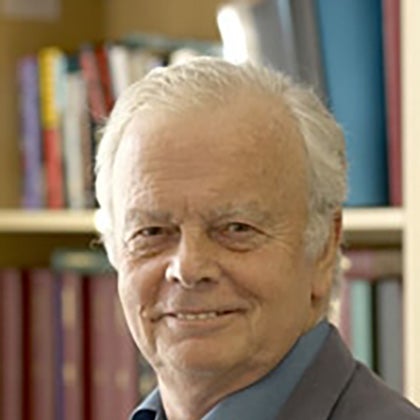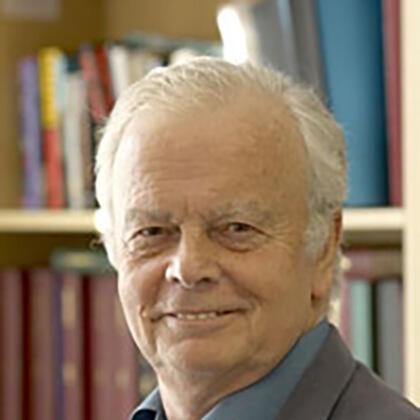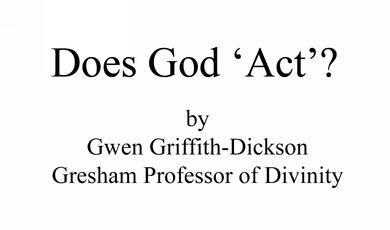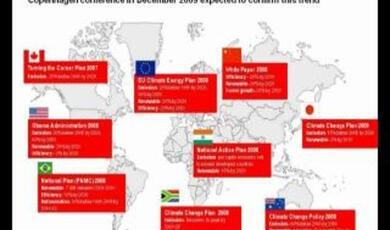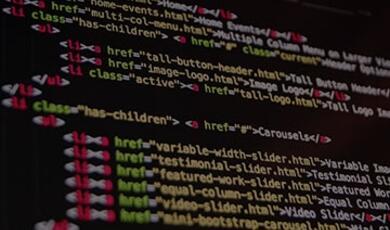Does Britain's education system need to go into a new gear?
Share
- Details
- Transcript
- Audio
- Downloads
- Extra Reading
Part of the "Job changes in the 21st century" series This series of lectures will look at major changes likely to take place in the workplace in the future, from a variety of different perspectives, and their implications. Presented by Professor Tim Connell Fellow of Gresham College
Download Transcript
When I thought about how one might answer the question Lord Moser chose for his lecture, I realised that the answer depended very much where one was coming from. Lets start with a few indicators that relate to what happens to 16-19 year olds in this country:
•the proportion obtaining 2 or more A levels
•the proportion entering higher education
and at 16:
•the proportion gaining 5 GCSEs at grades A-C
•the proportion staying on in full time study
If we step back two decades, on each of these indicators the proportions have more than doubled. More and more young people are being educated for longer to higher levels. However, let us express the current situation slightly differently:
•1 in 3 achieve 2 or more A levels
•2 in 5 enter higher education
•half gain 5 or more GCSEs at grades A-C
•70% stay on in full time study after 16; this percentage that falls to little over 5% at 17
These are proportions compare unfavourably, except in the case of HE entry, with most other EU countries. In other words some kind of gear change in policy is clearly necessary.
However I suspect, in formulating his question that Lord Moser had more quantitative matters in mind. We could:
•increase GCSE and A level pass rates
•achieve the target of 50% participation in HE
•reach continental European levels of staying on post 16
without necessarily achieving anything that the metaphor of gear change might be referring to.
In the 1960s there was an argument between the Left and the Right as to whether more necessarily meant worse - and there are echoes of it even today. The position adopted by the Right implies that we have reached limits of the capacities of our population to benefit from education and that therefore any increase in attainment or participation can only be at the price of reducing standards. I reject this argument; even within the UK Scotland has already reached 50% participation in HE. Furthermore, the continuing success of adults returning to education is a testament to the untapped talent in every generation. It is a seductive illusion of the educated, borrowed from an analogy with the gold standard- only if the well educaed are few in number can what they have achieved be really worthwhile.
I took my A levels in 1952 a year after they were launched, as one of only 3 in every hundred in the population who achieved them. Now in excess of 1 in 3 achieve two A levels. This makes A levels a very different phenomenon (there are parallels with increases in the proportion of those owning their own homes). Of course it makes A levels less valuable ‘on the market’ for a job or for entry into HE. However, it does not make them less of an achievement for the individual or imply any ‘dumbing down’.
Although it is easy to dismiss the argument that more necessarily means worse, a drop in standards is certainly a possible outcome of reduced expenditure per student when linked to a slavish devotion to achieving numerical targets. Targets can easily become instruments of control rather than guides to positive action
They can be achieved without regard to;
•What they mean
•what is being measured by the different indices that are being used.
In this lecture I will suggest that the focus on targets – not the specific targets themselves, but treating targets as ends rather than means - can become a barrier to achieving what we all want and what the government intends – a more knowledgeable workforce and a wiser more educated society.
My argument is twofold. First, in the focus on numerical targets - we are in danger of forgetting the fundamental purposes of education- especially education after the compulsory school leaving age. To put it another way - numerical targets make the complex process of teaching and learning appear similar to other quantifiable outcomes. Of course, there are similarities. However, what makes educational outcomes different from say income levels or car ownership may in some cases be more important than what makes them similar.
Second, if we forget the question of the purposes of education, in an era when more and more jobs require high levels of knowledge and skill, not only will the country suffer, but those who will suffer most will be young people from families with low incomes and fewest resources.
In my view the gear change referred to in Lord Moser’s question is not primarily quantitative but qualitative - it is about the purposes of education and therefore about the thinking necessary prior to the formulation of targets.
In order to address the question of educational purposes, I shall keep returning to two questions -
What is education - and more specifically - schools colleges and universities and their curricula for? Do our ideas about this need to change and in what way?
Educational institutions have many purposes:
•they care for young people and keep them off the labour market
•they provide evidence on which people are selected for jobs and opportunities for further study
•they help maintain social order, although not necessarily a just social order
•they help give people a sense of identity as citizens and in the case of vocational and professional education a sense of their occupational and professional identity
However educational institutions have one core and specific purpose associated with them and them alone-which in my view overides all the others-
•they enable young people (and adults) to acquire knowledge not available to them in their homes, at work or in the communities in which they live
This point may seem obvious, but it is often forgotten or at least taken for granted. The question then becomes what is the nature of that knowledge? how is it organised? Should it change?
How far should we take account of the fact that the historical roots of the present curriculum can be traced back to at least the mid 19 th century- a very different kind of society to that young people are entering today. For example, in contrast to even 50 years ago:
•the significance of industry and manufacturing are much less - numerically at least
•the service sector has expanded and diversified
•the speed with which knowledge becomes out of date has accelerated
•ICT has become almost ubiquitous
•we are part of a far more interdependent world, not an independent nation
The curriculum purposes most often referred to as appropriate to the 21st Century are flexibility, adaptability, ability to solve problems and willingness to learn; specific contents are rarely mentioned. The dilemma facing educationists is that people only learn specific contents in specific contexts. You cannot base a curriculum on being flexible or solving problems - people learn to solve specific problems.
In trying to update our education system recent government proposals are that:
•The National Curriculum is reduced to three compulsory subjects- English, maths and science- (it started in 1988 with 10)
•Modern Languages and Design Technology will, like History and Geography, become optional subjects
•14-16 year olds who will be able to take GCSEs in areas such as Engineering and Leisure and Tourism.
In other words the compulsory element of core academic knowledge has been substantially reduced.The government hope that as a result of these reforms more students will achieve more GCSEs at higher grades and in the process, learn to make choices and take more control of their own learning.
There have been number of responses to these proposals.
(i)They were widely welcomed in the ‘serious’ press as at last giving a proper value to vocational subjects and as a belated recognition of the importance of flexibility and student choice.
(ii) Others see them, like earlier innovations that go back to the early 1970s when the School Leaving Age was raised to 16, as at best a half hearted attempt to inject some relevance and practicality into the secondary curriculum.
An example is the recent RSA report on the future of schooling which argued for a far more radical move towards a skills-based curriculum which it saw as more in keeping with the demands of the knowledge society.
(iii) The emphasis on a more vocational curriculum and the target of reaching 50% participation in HE has been sharply criticised by some on the Right such as Chris Woodhead (the former Chief Inspector) as ‘dumbing down’ and ‘giving in to anti-elitist dogmas’. However the only alternative such critics offer is a return to a mythic ‘golden age’ when vocational education took the form of craft apprenticeship and academic studies followed in the foot-steps of Thomas Arnold’s Rugby. What they do not add is that the vast majority at that time received no post compulsory education at all. majority at that
There has been an absence of comment from mainstream educationalists. This may reflect a combination of an unease with the move to what appears as premature vocationalism for those with low attainments and a reluctance to appear elitist in defending a more traditional subject-based curriculum.
My problem with the government proposals is that they are governed almost entirely by the extrinsic purposes of education - trying to strenghthen the links between what young people study and their future in the world of work. Quite apart from serious questions about whether any link can be shown between obtaining a vocational GCSE and a young person’s future employability - this emphasis neglects the intrinsic purposes of education.
By this I do not the old idea of ‘education for its own sake’ but why we want more people to attend school, college and university - what is it that is distinctive about such experiences and the kinds of knowledge that can be acquired?
The case for allowing 14 year olds to choose L & T instead of geography or history is that the knowledge acquired will be more meaningful to young people - they will be taken out of the academic world of the school and into the everyday world of an expanding field of employment. It involves a shift in the criteria for what counts as school knowledge from a school subject such as geography to the knowledge involved, for example, in booking flights or holidays. In other words it assumes that the differences between academic and vocational learning are no longer important.
Is this shift merely a reflection of changing social needs in the new Century or does it imply something more fundamental about the type of knowledge acquired in the two cases. The remainder of my lecture moves beyond the specific case of geography and L & T to more general question implied about the basis for a “curriculum of the future“.
The two questions raised by the government’s recent proposals are:
Should the curriculum continue to be based on:
•a clear separation between the theoretical knowledge to be acquired at school and the practical knowledge that people acquire in their everyday lives?
AND
•the clear separation of subjects that were established as the model for the school curriculum in the last decade of the 19 th century?
Answers to these questions will depend, at least in part, on the assumptions that are made about the nature of knowledge, the extent to which what we understand by knowledge is shaped by wider social and economic changes and the extent to which the knowledge on which the curriculum is based should differ from the everyday knowledge of communities and workplaces. Let me explore these issues a bit further-
The belief that the knowledge acquired through the curriculum is cognitively superior to people’s everyday knowledge has been the major rationale for the expansion of formal education in the last century. On the other hand, radical educationists, including 19 th century socialists, 20 th century romantics and 21 st century adult educators have a long history of questioning these assumptions about the knowledge base of the curriculum.
Criticisms of a subject - based curriculum have gained a new and wider credibility in the last decade and come not just from radicals. A growing tension has become apparent between the flexibility and openness to innovation of advanced economies and the persistence of relatively rigid divisions between the different school subjects and between curriculum knowledge in general and the everyday knowledge that people use in their adult lives. Furthermore, it seems inconceivable that the curriculum could be immune from the dramatic changes both in society and in the modes and sites of the production of knowledge that we are currently witnessing. For example, universities no longer have a monopoly on two decades ago. On the other hand, a curriculum based on the separation of subjects from each other and on the clear separation of the curriculum from everyday knowledge has been an almost universal feature of education systems and has been has been associated with the massive expansion of knowledge and economic growth of the last two centuries. Those of us who gained our own education through such a curriculum, must think hard before rejecting it for the next generation of young people.
I want to sharpen the dilemma by characterising this tension between ‘past’ and possible ‘future’ curricula in terms of the contrasting principles of ‘insularity’ and ‘hybridity’.
The principle of insularity emphasises the differences rather than the continuity between types of knowledge. It rejects the view that the divisions and classifications between types of knowledge (for example between disciplines and between theoretical and everyday knowledge) in the curriculum are mere reflections of traditions established in earlier times and now increasingly out of date.
These classifications have, it is claimed, both epistemological and pedagogic significance; in other words they relate in fundamental ways to how people learn and how they produce new knowledge. The principle of insularity asserts that the conditions for new knowledge production and acquisition puts limits on the possibilities for curriculum innovation - in particular the crossing of disciplinary boundaries and the incorporation of practical ‘know-how’ and skills into the curriculum. There will be, it is argued, a pedagogic (and, in relation to research, an epistemological) price to pay for dispensing with such boundaries.
Not surprisingly, this principle of insularity can be invoked uncritically in defence of the curriculum status quo. However there are two points to make here. First insularity refers to relations between contents of knowledge, not to the specific contents themselves. Second, the argument in support of insularity is not just political. It is based on a view that knowledge cannot be equated solely with social needs or interests at a particular time. As Descartes put it nearly four centuries ago, real knowledge is beyond all ‘custom and example’.
The principle of hybridity, on the other hand is a more recent idea. It rejects the claim that the boundaries and classifications between subjects and disciplines reflect features of knowledge itself and sees them as a product of particular historical circumstances and interests. It stresses
the “essential unity and continuity of all forms and kinds of knowledge (theoretical and everyday)… (and) the permeability of all classificatory boundaries
The principle of hybridity is defended in terms of its consistency with the increasingly ‘boundary-less’ character of modern economies and societies. A curriculum based on the principle of hybridity provides, it is argued, a way of overcoming the traditional boundedness of school or academic knowledge and hence can make schools more relevant to the real world at the same time, by being more inclusive and adaptable, promote the goals of equality and social justice.
The principle of hybridity assumes a fundamentally relativist view of knowledge and has always appealed to radicals as a basis for exposing the vested interests associated with existing boundaries and their claims to universality. There are, however, specific political reasons why a curriculum based more on the principle of hybridity has begun to appeal to education policy makers; it appears to converge with the new policy goals of social inclusion and accountability. Pressures for social inclusion require the curriculum to go ‘beyond its traditional subject boundaries’ and recognise the knowledge and experience of those traditionally excluded from formal education. Likewise, pressures for greater accountability seek to limit the autonomy of subject specialists and open the curriculum up to a wider group of stakeholders.
In both cases the insularity of academic knowledge is set against social and economic arguments for a more ‘responsive’ curriculum that can be the basis for new kinds of skills and knowledge that transcend current disciplinary boundaries and academic/vocational divisions. In rejecting any link between specific knowledge classifications and either pedagogic requirements or epistemological principles, the hybridity principle implies that decisions about the curriculum will (and should) depend, ultimately, on market pressures and political not educational priorities. An example is the growing number of programmes launched in Higher Education designed with the primary purpose of attracting more students.
The outcome of the tension between these two principles seems currently to point in two directions. One is towards the progressive disappearance and replacement of the disciplinary curriculum and, it could be argued, the weakening of an autonomous critical role for educational institutions. The other is the emergence of new divisions between elite institutions (both schools and universities) which are likely to continue to maintain discipline-based curricula and mass institutions under pressure to develop curricula geared to more immediate economic and political demands.
The task yet to be taken up by curriculum theorists is to find a basis for the curriculum that goes beyond these options.
The crucial questions are-
Should priority be given to the differentiation of knowledge, especially the differences between theoretical and everyday knowledge? In this case there is a powerful argument for retaining geography and history as compulsory components of the curriculum
On the other hand, should priority be given to the unity of knowledge? If the answer is yes, there is a good case for the combination of practical and theoretical knowledge that is found in a field like Leisure & Tourism being just as acceptable as geography or history.
The alternative, which I want to argue for, is to accept the differentiation of knowledge argument but to recognise that its historical form is likely to change. The curriculum developed in the late 19 th/early 20 th century as a list of subjects; however, it was not only a list of subjects, it was also a set of codes, rules practices and forms of association among those involved in specialist fields of enquiry and in the debates about knowledge that developed within them. A future curriculum may not need to retain the traditional subjects; however it does need to retain the forms of social organisation that underpins their claims to knowledge.
This view of the curriculum depends on a number of assumptions.
•It was these codes and practices, associated with subjects and disciplines that set geography history and the sciences apart from the practical knowledge people had developed in all societies in the course of their everyday and working lives.
•These rules and codes were explicitly associated with educational institutions which were removed from the demands of either family, working or political life.
•It was this separation of educational institutions from the rest of society and of curriculum from everyday knowledge that gave the knowledge acquired through the school and university curriculum an objectivity and explanatory power that was not a feature of knowledge tied to practical concerns and the exigencies of everyday life.
The implications of this analysis of the curriculum are:
•If the curriculum is to continue to be the basis of access to explanatory concepts, it cannot be based on everyday practical experience—at least not directly. If it is it will only serve to exclude those presented with such a curriculum from access to such concepts and therefore to what is generally defined as ‘an education’.
•The form and content that curriculum takes is not and should not be static. It has historical roots in the time when mass education began. It is this form and its structure that is being questioned in recent government reforms.
•We should be cautious about blurring disciplinary and subject boundaries and replacing knowledge based on specialist research and pedagogic communities with knowledge based on immediate practical concerns of employers.
•Reforms that replace knowledge based on the codes and practices of specialist subjects and disciplines with the practical knowledge of different occupational sectors are in danger of emphasising procedures which focus on ‘how to do things’ instead of on explanations concerned with ‘why things are as they are’ .
•Addressing ‘why questions’ is not something restricted to school subjects as we know them. However it does depend, as in the case of fields such as engineering, architecture, medicine and accountancy- on knowledge shared by specialist teachers, university researchers and professional associations. Not to rely on such forms of organisation- as in the case of Leisure and Tourism is to seek a short cut to increasing participation which can only perpetuate inequalities. This is of course not to say that such any particular field could never be the basis of subject knowledge in the sense that I have defined it.
•A curriculum of the future needs to treat knowledge as a distinct an non-reducible element in the ever changing ways in which people continue to strive to overcome the constraints of the circumstances in which they find themselves. In relation to the starting point of this paper, these circumstances refer to the making, remaking and crossing of boundaries between disciplines and between school and workplace knowledge. These boundaries can be “prisons and stereotypes; they can also be tension points condensing the past and opening up possible futures.
From the point of view developed here, we have a tension between two approaches to curriculum organisation which might be expressed as the curriculum of the past and the curriculum of the future. The distinction can be summarised as relating to the following dimensions:
•insulation and connectivity between disciplines and subjects
•knowledge and the application of knowledge
•the separation or integration of general and vocational learning
•the linear sequencing of learning in contrast toan approach based on the modular accumulation of credit
Some take for granted that knowledge is best produced and transmitted through insulated, specialist, and linear modes of acquisition and disregard the political and economic changes which are calling into question these principles as well as the inequalities of access and outcomes that are associated with them. However, there is a strength in this 'curriculum of the past'; it is located in a history of social networks, trust and codes of practice which give it an objectivity and a concept of standards which transcend its social origins.
Critics of the curriculum of the past emphasise its lack of fit with the global economic context; they interpret knowledge and learning needs from the statements made by employer organisations who call for a more flexible skill - based curriculum However they invaraiably fail to the importance of establishing the new forms of association and trust that will be needed if the new types of knowledge that they call for are to fullfill the claims made for them.
The result of the unresolved tension between the two curriculum models is a kind of ad hoc and pragmatic modification of the curriculum of the past; the ‘new’ curriculum is still underpinned, at least in part, by the traditional social networks of subject specialists. Two questions remain. First, what pedagogies need to be developed that will extend access to theoretical knowledge beyond the 50% who currently gain 5 or more GCSEs at gradess A-C? Second, how is the curriculum to be broadened and the new networks of specialists that underpin them be established to take account of global economic changes without losing the crucial independence that the was given by the old subjects?
I would like to end with a quote from the French philosopher, Paul Valery, which though written sixty years ago, makes my argument better than I can;
..the rules of classic art teach us by their arbitrary nature that the thoughts arising from our daily needs, sentiments and experiences are only a small part of the thoughts of which we are capable.
This event was on Mon, 24 Feb 2003
Support Gresham
Gresham College has offered an outstanding education to the public free of charge for over 400 years. Today, Gresham plays an important role in fostering a love of learning and a greater understanding of ourselves and the world around us. Your donation will help to widen our reach and to broaden our audience, allowing more people to benefit from a high-quality education from some of the brightest minds.


 Login
Login




